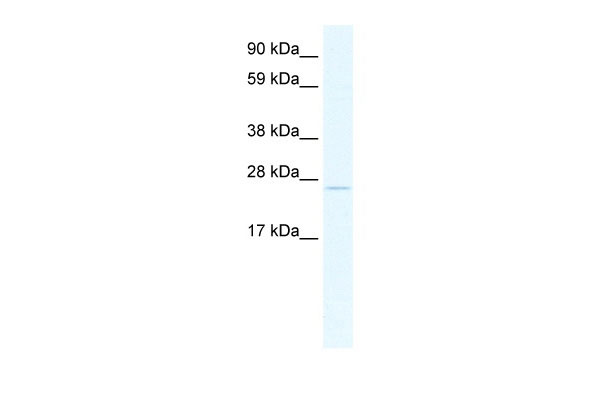TCF23 antibody - C-terminal region
Rabbit Polyclonal Antibody
- SPECIFICATION
- CITATIONS
- PROTOCOLS
- BACKGROUND

Application
| WB |
|---|---|
| Primary Accession | Q9JLR5 |
| Other Accession | NM_053085, NP_444315 |
| Reactivity | Mouse |
| Predicted | Mouse |
| Host | Rabbit |
| Clonality | Polyclonal |
| Calculated MW | 23kDa |
| Gene ID | 69852 |
|---|---|
| Alias Symbol | Out, bHLHa24, 2010002O16Rik |
| Other Names | Transcription factor 23, TCF-23, Basic helix-loop-helix transcription factor OUT, Ovary, uterus and testis protein, Tcf23, Out |
| Format | Liquid. Purified antibody supplied in 1x PBS buffer with 0.09% (w/v) sodium azide and 2% sucrose. |
| Reconstitution & Storage | Add 100 ul of distilled water. Final anti-TCF23 antibody concentration is 1 mg/ml in PBS buffer with 2% sucrose. For longer periods of storage, store at 20°C. Avoid repeat freeze-thaw cycles. |
| Precautions | TCF23 antibody - C-terminal region is for research use only and not for use in diagnostic or therapeutic procedures. |
| Name | Tcf23 |
|---|---|
| Synonyms | Out |
| Function | Inhibits E-box-mediated binding and transactivation of bHLH factors. Inhibitory effect is similar to that of ID proteins. Inhibits the formation of TCF3 and MYOD1 homodimers and heterodimers. Lacks DNA binding activity. May be involved in the regulation or modulation of smooth muscle contraction of the uterus during pregnancy and particularly around the time of delivery. Seems to play a role in the inhibition of myogenesis. |
| Cellular Location | Nucleus {ECO:0000255|PROSITE-ProRule:PRU00981, ECO:0000269|PubMed:10652346} |
| Tissue Location | Highly expressed in the uterus (predominantly in myometrium), ovary, and testis. Expression in the uterus is higher in the diestrus phase than in the estrus phase and reaches a maximum at 7.5 dpc. Expression declines towards the time of delivery and returns to the non-pregnant level 4 days after delivery. Low expression seen in lung, heart, intestine, and spleen. |

Thousands of laboratories across the world have published research that depended on the performance of antibodies from Abcepta to advance their research. Check out links to articles that cite our products in major peer-reviewed journals, organized by research category.
info@abcepta.com, and receive a free "I Love Antibodies" mug.
Provided below are standard protocols that you may find useful for product applications.
References
Tachibana,M., et al., (2003) Cytogenet. Cell Genet. 94 (1-2), 23-25Reconstitution and Storage:For short term use, store at 2-8C up to 1 week. For long term storage, store at -20C in small aliquots to prevent freeze-thaw cycles.
If you have used an Abcepta product and would like to share how it has performed, please click on the "Submit Review" button and provide the requested information. Our staff will examine and post your review and contact you if needed.
If you have any additional inquiries please email technical services at tech@abcepta.com.













 Foundational characteristics of cancer include proliferation, angiogenesis, migration, evasion of apoptosis, and cellular immortality. Find key markers for these cellular processes and antibodies to detect them.
Foundational characteristics of cancer include proliferation, angiogenesis, migration, evasion of apoptosis, and cellular immortality. Find key markers for these cellular processes and antibodies to detect them. The SUMOplot™ Analysis Program predicts and scores sumoylation sites in your protein. SUMOylation is a post-translational modification involved in various cellular processes, such as nuclear-cytosolic transport, transcriptional regulation, apoptosis, protein stability, response to stress, and progression through the cell cycle.
The SUMOplot™ Analysis Program predicts and scores sumoylation sites in your protein. SUMOylation is a post-translational modification involved in various cellular processes, such as nuclear-cytosolic transport, transcriptional regulation, apoptosis, protein stability, response to stress, and progression through the cell cycle. The Autophagy Receptor Motif Plotter predicts and scores autophagy receptor binding sites in your protein. Identifying proteins connected to this pathway is critical to understanding the role of autophagy in physiological as well as pathological processes such as development, differentiation, neurodegenerative diseases, stress, infection, and cancer.
The Autophagy Receptor Motif Plotter predicts and scores autophagy receptor binding sites in your protein. Identifying proteins connected to this pathway is critical to understanding the role of autophagy in physiological as well as pathological processes such as development, differentiation, neurodegenerative diseases, stress, infection, and cancer.


